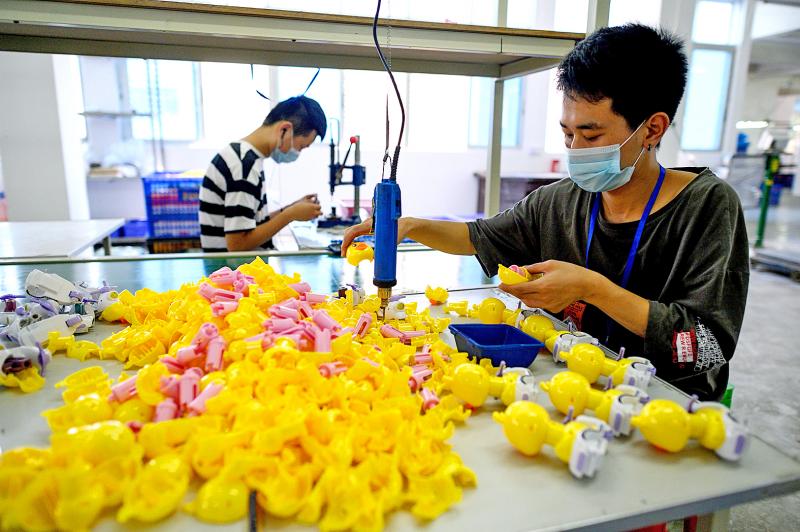Asia’s factory pain deepened last month as the slump in global trade caused by the COVID-19 pandemic worsened, with export powerhouses Japan and South Korea suffering the sharpest declines in business activity in more than a decade.
A series of manufacturing surveys released yesterday suggest that any rebound in businesses would be some time off, even though China’s factory activity unexpectedly returned to growth last month.
China’s Caixin/Markit Manufacturing Purchasing Managers’ Index (PMI) hit 50.7 last month, marking the highest reading since January as easing of lockdowns allowed companies to get back to work and clear outstanding orders.

Photo: AFP
However, with many of China’s trading partners still restricted, its new export orders remained in contraction, the private business survey showed yesterday.
China’s official PMI survey on Sunday showed that the recovery in the world’s second-largest economy was intact, but fragile.
Japan’s factory activity last month shrank at the fastest pace since 2009, a separate private sector survey showed.
The final au Jibun Bank Japan Manufacturing PMI in April fell to a seasonally adjusted 38.4 from 41.9, its lowest since March 2009.
South Korea also saw manufacturing slump at the sharpest pace in more than a decade.
The IHS Markit PMI edged down to 41.3, the lowest since January 2009 and below 41.6 in April.
Capital Economics Ltd said that the region’s manufacturing sector is in deep recession.
“Industry is likely to have seen an initial jump from the easing of lockdown restrictions. And things are likely to continue improving very gradually over the coming months as external demand recovers,” Capital Economics wrote. “But output is still likely to be well below normal levels for many months to come, as domestic and global demand remain very depressed.”
Taiwan’s manufacturing activity also fell last month. Vietnam, Malaysia and the Philippines saw PMIs rebound from April, although the indices all remained below the 50-mark threshold that separates contraction from expansion.
Official data showed South Korea extending its exports plunge for a third straight month.
India’s factory activity contracted sharply, extending the major decline seen in April as a government-imposed lockdown hammered demand.
Asia’s economic woes are likely to be echoed in other parts of the world, including Europe, where economies continue to suffer huge damage in factory and service sectors.
With many countries starting to ease lockdown restrictions imposed to stop the spread of the virus, which has infected over 5.5 million people globally, equity markets are rallying on hopes for a swift return to health and prosperity.
However, the trough in global economic activity would be deeper and the rebound is likely to take longer than previously predicted as the pandemic spreads in waves.
The IMF last month said that the global economy would take much longer than expected to recover fully from the virus shock, suggesting a downgrade to its projection for a 3 percent contraction this year.
A US-China spat over Hong Kong’s status and Beijing’s handling of the pandemic could sour business sentiment and add to already huge strains on the global economy.

MULTIFACETED: A task force has analyzed possible scenarios and created responses to assist domestic industries in dealing with US tariffs, the economics minister said The Executive Yuan is tomorrow to announce countermeasures to US President Donald Trump’s planned reciprocal tariffs, although the details of the plan would not be made public until Monday next week, Minister of Economic Affairs J.W. Kuo (郭智輝) said yesterday. The Cabinet established an economic and trade task force in November last year to deal with US trade and tariff related issues, Kuo told reporters outside the legislature in Taipei. The task force has been analyzing and evaluating all kinds of scenarios to identify suitable responses and determine how best to assist domestic industries in managing the effects of Trump’s tariffs, he

TIGHT-LIPPED: UMC said it had no merger plans at the moment, after Nikkei Asia reported that the firm and GlobalFoundries were considering restarting merger talks United Microelectronics Corp (UMC, 聯電), the world’s No. 4 contract chipmaker, yesterday launched a new US$5 billion 12-inch chip factory in Singapore as part of its latest effort to diversify its manufacturing footprint amid growing geopolitical risks. The new factory, adjacent to UMC’s existing Singapore fab in the Pasir Res Wafer Fab Park, is scheduled to enter volume production next year, utilizing mature 22-nanometer and 28-nanometer process technologies, UMC said in a statement. The company plans to invest US$5 billion during the first phase of the new fab, which would have an installed capacity of 30,000 12-inch wafers per month, it said. The

‘SWASTICAR’: Tesla CEO Elon Musk’s close association with Donald Trump has prompted opponents to brand him a ‘Nazi’ and resulted in a dramatic drop in sales Demonstrators descended on Tesla Inc dealerships across the US, and in Europe and Canada on Saturday to protest company chief Elon Musk, who has amassed extraordinary power as a top adviser to US President Donald Trump. Waving signs with messages such as “Musk is stealing our money” and “Reclaim our country,” the protests largely took place peacefully following fiery episodes of vandalism on Tesla vehicles, dealerships and other facilities in recent weeks that US officials have denounced as terrorism. Hundreds rallied on Saturday outside the Tesla dealership in Manhattan. Some blasted Musk, the world’s richest man, while others demanded the shuttering of his

Taiwan’s official purchasing managers’ index (PMI) last month rose 0.2 percentage points to 54.2, in a second consecutive month of expansion, thanks to front-loading demand intended to avoid potential US tariff hikes, the Chung-Hua Institution for Economic Research (CIER, 中華經濟研究院) said yesterday. While short-term demand appeared robust, uncertainties rose due to US President Donald Trump’s unpredictable trade policy, CIER president Lien Hsien-ming (連賢明) told a news conference in Taipei. Taiwan’s economy this year would be characterized by high-level fluctuations and the volatility would be wilder than most expect, Lien said Demand for electronics, particularly semiconductors, continues to benefit from US technology giants’ effort